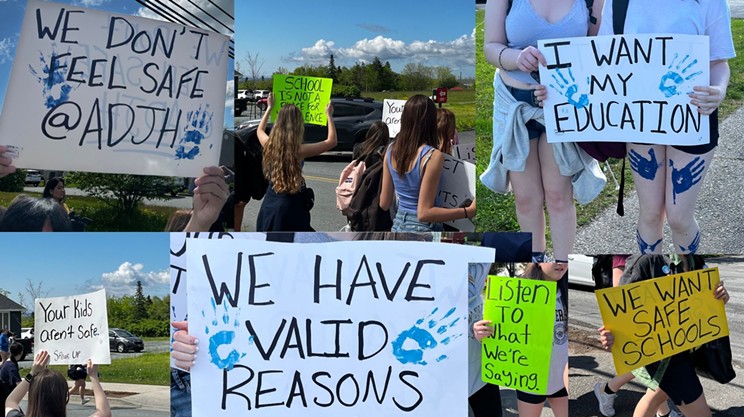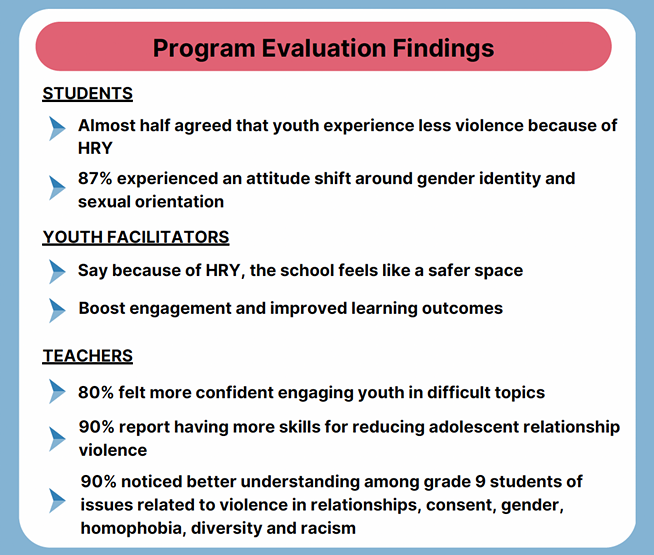It doesn’t take a rocket scientist to confirm that there is something very amiss in HRM schools. The threat of violence seems to be looming like a dank fog. Ongoing bomb threats and fear of violence has led many teens to go as far as arming themselves. Just last week, students staged a walkout, waving signs that read “we don’t feel safe” and “we want safe schools.”
It seems clear that whatever the province is doing (if they’re doing anything) to make kids feel safe is not working. So, maybe it’s time to look at something…else?
The Antigonish Women's Centre and Sexual Assault Services Association— a community-based registered charity—is (and has been since 2006) delivering a program to local schools that teaches students about healthy relationships as a way to mitigate gender-based violence; to be proactive rather than reactive, and ultimately, to make kids feel safe at school.
It’s called The Healthy Relationships for Youth Program (HRY) and by all accounts, it’s working. According to program data, 77% of youth facilitators and 49% of participants feel their school is a safer space because of it.
And if the numbers aren’t convincing enough, the HRY recently received a $2.5M boost from the Public Health Agency of Canada and the Nova Scotia Advisory Council on the Status of Women to expand it into more schools in the province.
Apart from the obvious need (refer again to children arming themselves), the main reasons for the injection of funding is how closely the program’s mission aligns with recommendations made in both the National Action Plan to End Gender-Based Violence and the Nova Scotia Mass Casualty Commission (MCC).
“I don’t think it’s any secret to any women’s centre across Nova Scotia that gender-based violence and intimate partner violence is at epidemic levels,” says Anita Stewart, executive director of the Antigonish Women's Centre and Sexual Assault Services Association. “Unfortunately, because of the mass casualty, the issue has been brought tragically to the forefront.”
The HRY directly aligns with the recommendations that are found in “Turning The Tide”—the final report of the MCC by integrating a gender-based violence curriculum right into the school system and engaging youth—of all genders—as allies to advocate against gender-based violence.
“This program puts a focus on primary prevention strategies that address the root cause of gender-based violence in order to stop the violence before it occurs,” says Stewart. “We’re also implementing input from the youth advisory group which amplifies diverse voices and experiences.”
Crucially, the program tackles the issue of preventing violence in the moment while addressing social and cultural factors that do contribute to condoning gender-based violence.
And here’s the cool part: the whole program is peer based. Which is great because nobody loves older kids more than younger kids, right?
“The program is offered in partnerships with schools where Grade 11 and 12 students are trained by regional coordinators to deliver a series of 12 sessions to Grade 9 students throughout the school year,” explains Stewart. “It’s different than having a teacher come in and talk about healthy relationships. Having a peer-centred model brings credibility because the younger students are looking up to the older ones as role models.”
Plus, parts of the program do meet the Grade 9 healthy living curriculum, which is an added bonus for the schools. And it’s free for all schools that participate.
“Every year we update the curriculum to ensure that it stays relevant and current,” says Stewart. “We go through what we call the external process—bringing on people that are not our employees—to evaluate all aspects of the program and bring suggestions to the table. We also conduct internal evaluations from the teachers and the students themselves.”
And the results are pretty clear: Two-thirds of the youth participants and almost all of the youth facilitators say HRY had a positive impact on their behaviour—a point supported by teachers and youth facilitators. They also report an increased understanding of conflict resolution, hypersexualization, and healthy and unhealthy relationships.
“Talking about healthy versus unhealthy relationships is really key when we’re talking about grade 9 students,” says Stewart. “They may not understand or know what an unhealthy relationship looks like. For example, when a partner asks for your phone and wants to read your text messages, that is unhealthy. It’s not cute.”
The program’s effectiveness has also been recognized by the Nova Scotia Child and Youth Strategy, the Nova Scotia Department of Justice, and the Canadian Centre for Policy Alternatives.
So, what’s next?
“We would love to see the Department of Education make this mandatory, but that’s not something we have so much control over,” says Stewart. “But our short-term goal is to have this program available to all schools across Nova Scotia and we have recently hired people to help with that expansion.”
In other words, the program is ready when schools are.
The Coast reached out to both the Halifax Regional Centre for Education and the Nova Scotia Department of Education and Early Childhood Development to ask if they were aware of the program and how it could be implemented in HRM schools.
Both declined interviews and did not provide a statement at the time of publication.



